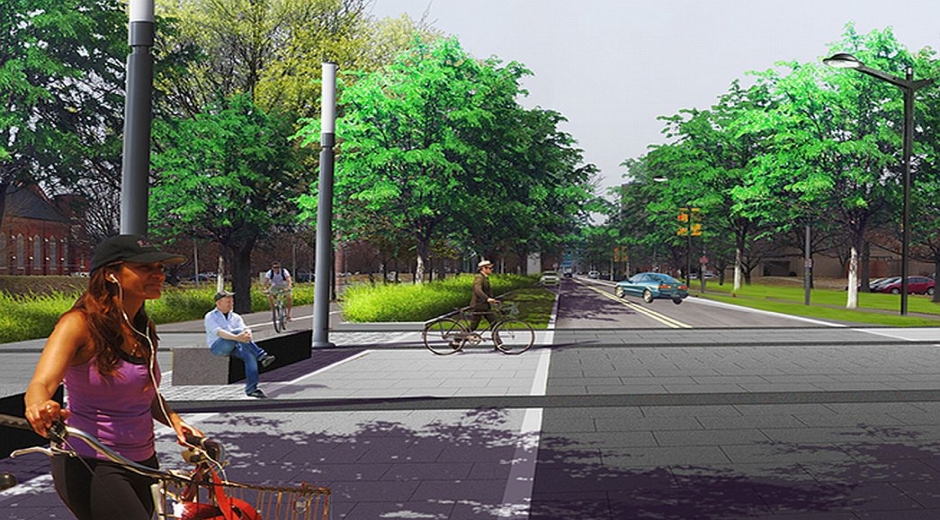
Louisville Mayor Announces New Transportation Plan

Thomas McAdam
iLocalNews Louisville is your best source of news and information about Derby City.
- Professional Journalist
Mayor Greg Fischer today unveiled Move Louisville during the Regional Mobility Summit hosted by the Transit Authority of the River City. Move Louisville is the city’s 20-year multi-modal plan, and it purports to take a “holistic approach” to the city’s transportation system, which is a $5 billion asset that includes roadways, sidewalks, bike networks and trails.
The top two priorities identified in the plan are fixing and maintaining the existing infrastructure and reducing the number of miles that Louisvillians drive by providing and improving mobility options.
“If we fix our existing streets and sidewalks, embrace premium transit, and provide more complete streets with improved connectivity, we can create a safer, healthier and more livable city, and that will help us grow jobs,” said Fischer. “This investment in big, critical, long-term projects will strategically align us to support a thriving 21st Century city.”
The full report can be read HERE.
The plan identifies 16 transformative projects that will help people travel to and from work, will increase safety, will provide more options for people to get around and will keep Louisville economically competitive, by building and maintaining an innovative transportation system.
● Premium Transit Corridors/Complete Streets
East-West Transit Corridors
Transforming Dixie Highway
Broadway Complete Street
Preston Corridor Premium Transit
● Regional Economic Development
Oxmoor Farms Bridges & Access
Urton Lane Corridor
East Louisville Connectivity
West Louisville Connectivity
● Downtown and Edge Neighborhood Access
Reimagine Ninth Street
Downtown/Edge Neighborhood Two-Way Streets
River Road Complete Street
Main Street/Story Ave Redesign
Lexington Road Complete Street
● Bike/Pedestrian
Central Bicycle Network
Sidewalk Connectivity
Louisville Loop
“In the last five years, we’ve added 47,000 new jobs, 2,500 new businesses and seen billions in new investments. To keep that momentum going, our economy demands a safe, reliable and affordable transportation system,” said Fischer. “And creating new multi-modal options making it easier to walk, bike and take public transportation makes our city more attractive to the talent we need.”
Specifically, the plan calls for making sure Louisville streets serve all people and introducing fast and reliable premium transit options that could include street car, rail or Bus Rapid Transit, which is currently underway along Dixie Highway. Move Louisville recommends strengthening and developing compact, walkable centers along Louisville’s major corridors like Dixie Highway, Bardstown Road, Preston Highway and Shelbyville Road.
Projects like completing the planned extension of Urton Lane from Middletown to Taylorsville Road and remaking 9th Street into a true urban boulevard will make it easier for people to get around the city and will improve the quality of life in Louisville neighborhoods.
Additionally, the plan identifies 8 policies that will guide the city’s future transportation investments and will inform land use and transportation decision-making. Those policies include shifting and increasing funding allocations, making Complete Street principles the norm, prioritizing high capacity corridors, considering transit a catalyst for infill development, streamlining transit service on key corridors, setting policy on preferred freight routes, managing parking and embracing smart mobility.
Embracing Complete Street improvements, like the ones being made on East Market Street, and using technological advancements in every day life, like Uber and Lyft, will make Louisville’s streets safer and easier to get around.
Move Louisville prioritizes $1.4 billion over a 20-year period for improvements that are critical to enhancing the city’s transportation network – a $5 billion asset. Funding for Move Louisville projects and priorities will come from a variety of sources, including federal, state and local dollars, along with grants like the one being used for Dixie Highway improvements.
Projects and priorities outlined in the Move Louisville plan were developed after a series of public meetings where citizens gave feedback about how to improve Louisville’s transportation system.
The Move Louisville plan was funded largely by a grant from the federal government, with additional funds provided by Louisville Metro Government and TARC. The planning process was led by Louisville Metro Government’s Office of Advanced Planning, in close partnership with Public Works and TARC and assisted by a team of consultants led by Nelson\Nygaard Consulting Associates.